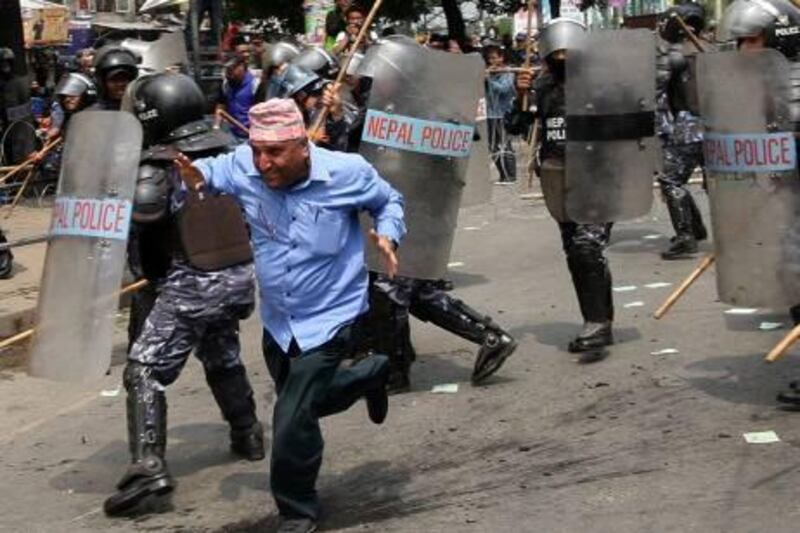KATHMANDU // Nepal is blessed with glacier-fed rivers but its capital has running water only a few hours a week. The country had no prime minister for much of the past year and risks having no government at all by the weekend.
Five years after communist rebels gave up a revolt to join a peace process, the country is sinking deeper into political turmoil, leaving its dreams of becoming a "Switzerland of the East" unrealised.
Nepal went seven of the past 12 months without a prime minister because of a power struggle between the main political parties. They have yet to figure out what to do with the former insurgent fighters, with many still confined to demobilisation camps.
And on Saturday, the Constitutional Assembly, which serves as the country's legislature, is due to dissolve without coming close to agreeing on the document that is supposed to outline how the new Nepal will be governed.
The Nepalese are growing fed up with their politicians, who have left the nation's problem fester.
Hari Tamang, a student who joined a recent protest demanding action on the new constitution, said: "They have broken every promise they have made to the people."
Residents face up to 14 hours of daily power cuts because the government has been unable to build hydroelectricity plants. The capital, Kathmandu, gets two hours of water every two or three days, and frequent fuel shortages force drivers to line up for a few litres of rationed fuel.
The squabbling delayed last year's budget, forcing the government to put off or scrap plans to build roads, irrigation projects and other agricultural infrastructure.
The finance secretary, Krishna Hari Baskota, said the government failed to spend half the development budget for the financial year which ends in July.
Ameet Dhakal, editor of the Republica newspaper, said: "Countrywide people are unhappy with the leadership."
Since the assembly was first elected in 2008 to write a constitution aimed at cementing the peace and bringing Nepal from a monarchy to a republic, the country has produced three different governments and no constitution.
The government of the Maoists, parliament's largest party, fell apart over a battle with the president and army chief, leaving the smaller parties to join together to form a new government. But the Maoists demanded they be given another shot at power and the constitution-writing process ground to a halt.
Some of the disagreements centre on whether to divide the country in a federal system based on ethnic groups or strictly by geography. But the parties mostly squabble over who gets to lead the country.
When the Constitutional Assembly's two-year term was about to expire last May, a last-minute deal was reached, with the Maoists agreeing to extend the deadline for a year in return for the government's resignation. That created even more turmoil, with the parties unable to agree on a new government for seven months, frittering away more than half of the assembly's extension. On the 17th round of voting, in February, they finally chose a new leader.
Fed up with the delays in the peace process, the United Nations pulled out in January.
The population is fed up as well, holding almost daily protests in Kathmandu demanding the parties get down to work.
"You have taken your pay, now give us our constitution," hundreds of protesters chanted at a weekend rally called by a group called Nepal Unites.
Subsequent rallies near the Constituent Assembly prompted authorities to declare a no-protest zone in the surrounding streets.
Mr Tamang said: "When the term was extended last year, they promised they would get their act together and complete the constitution but they spent the whole term trying to unseat each other to get in power."





